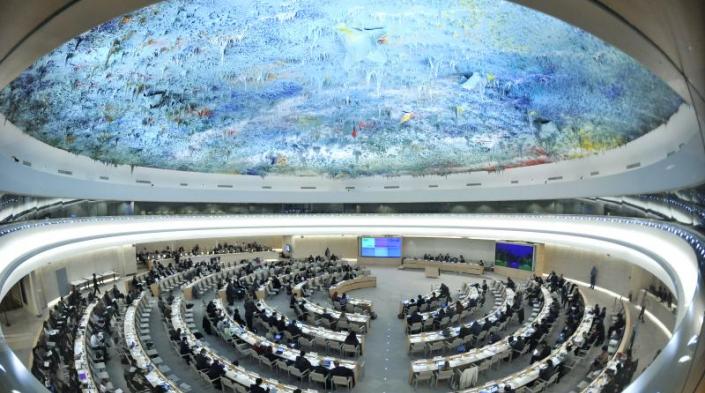In light of the COVID-19 pandemic, the 46th Session of the United Nations Human Rights Council (UNHRC) was held virtually between 22 February and 23 March 2021. Americans for Democracy & Human Rights in Bahrain (ADHRB) welcomed the 46th session as an opportunity to draw attention to the deteriorating human rights condition in Bahrain and the Gulf states, especially amidst the fatal pandemic. During the 46th session, ADHRB submitted four written statements to the Council denouncing humanitarian abuses in Bahrain, Saudi Arabia, and Yemen. ADHRB also delivered seven virtual oral interventions condemning the human rights abuses in Bahrain, Saudi Arabia, and Yemen, and calling on the council to hold their governments accountable for their actions.
Concerned about the humanitarian crisis in Yemen as well as the involvement of Saudi Arabia and the United Arab Emirates (UAE), ADHRB submitted a written statement to the HRC during its 46th session. In the statement, ADHRB expressed its concerns about the “ongoing famine, COVID-19 pandemic, economic crisis, and outbreak of cholera in Yemen”. ADHRB expressed its concern about the violations of international humanitarian law committed by the Saudi-UAE led coalition. ADHRB urged the governments of Saudi Arabia and the UAE to “halt all airstrikes until an international, independent and impartial commission can investigate all the allegations of attacks against civilians” and work to end the conflict through a political settlement. ADHRB also urged the two governments to ensure the provision of clean water, fuel, and other “life-saving imports”. On 16 March, ADHRB delivered a virtual oral intervention under item 4 condemning the Coalition blockade on basic necessities, which caused malnutrition diseases that led to hundreds of thousands of deaths in Yemen, and calling for a recommendation to the Security Council to transfer these crimes of genocide and crimes against humanity to the International Criminal Court (ICC). On 19 March, ADHRB also delivered another virtual oral intervention under item 9 denouncing the mobility restrictions and discriminatory arbitrary detentions by the coalition.
Additionally, ADHRB submitted a written statement denouncing the ongoing climate violations committed by the government of Bahrain, highlighting their dangerous impact on the local environment and the population. However, despite recognizing the environmental hazards caused by rapid urbanization and climate change, the Bahraini Government continues to persecute environmental human rights defenders. In the statement, ADHRB urged the government of Bahrain to drop all charges against all environmental human rights defenders, and to advance environmental policies like developing an extensive public transportation infrastructure and promoting the use of electric cars to reduce carbon emissions.
Concerned about the condition of political prisoners in Bahrain during the COVID-19 pandemic, ADHRB issued a written statement denouncing the lack of sanitation and medical care, in violation of the Mandela rules (United Nations Standard Minimum Rules for the Treatment of Prisoners) and international humanitarian law. In the statement, ADHRB provided several recommendations including urging the Government of Bahrain to “drop all charges against human rights defenders” detained for their activism, ensure “the provision of adequate and necessary medical care for all prisoners”, and “end the culture of impunity in Bahrain”. On March 10, ADHRB also delivered a virtual oral intervention under item 3, raising concerns about the repression human rights and civil society activists face in Bahrain under the newly appointed Prime Minister Crown Prince Salman bin Hamad Al-Khalifa. On 16 March ADHRB delivered two virtual oral interventions at 46th session under item 4, condemning the growing culture of impunity among officials in the Gulf Cooperation Council countries and calling on the Council to adapt human rights membership standards to block governments that engage in systematic human rights violations. On 19 March, another virtual oral intervention was delivered by ADHRB under item 8, calling on the Council to hold the government of Bahrain accountable for violating human rights and respect the Bahraini people’s needs to achieve democracy. Accordingly, on 19 March, ADHRB also delivered a virtual oral intervention reiterating the Bahraini people’s right to political self-determination and condemning the dictatorship of Al-Khalifa.
ADHRB also submitted a written statement concerning the detention of Women’s Rights defenders in Saudi Arabia. ADHRB denounced the prison authorities’ failure to provide basic medical care to inmates. ADHRB called upon the Government of Saudi Arabia to release and drop all charges against imprisoned Women’s Rights defenders. ADHRB also urged the Government of Saudi Arabia to “abolish the male guardianship system”.
In line with the 46th session’s activities, on 17 March, ADHRB organized a virtual seminar titled “Patterns of Torture in Bahrain: Perpetrators must Face Justice” in collaboration with the Gulf Centre for Human Rights, Bahrain Center for Human Rights, and International Federation for Human Rights, highlighting the joint report they released about the patterns of torture in Bahrain. In the virtual seminar, the speakers reiterated the importance of accountability in ending the culture of impunity in Bahrain, recommended the establishment of a permanent OHCHR country office in Bahrain, and called for the investigation of the crimes documented in the report, and other crimes against humanity perpetrated in the country.
By participating effectively at the UNHCR 46th session, ADHRB managed to address the most severe human rights violations in the Gulf states and call on their governments to uphold the principles of human rights.





